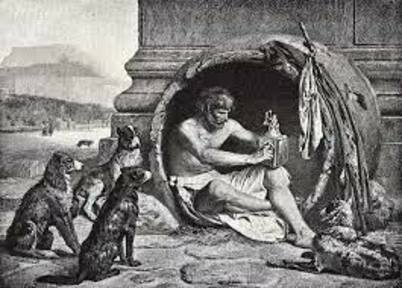On contrarians – Costica Bradatan in TLS:
‘“In a sense”, writes M. D. Usher in his introduction to How to Say No, every sentence that Diogenes the Cynic uttered “contains a no in it”. And not just every sentence. Everything that he did in public (and he did most things in public), from the coin-defacement scandal (because of which he had to leave his native Sinope and embark on a life of exile, poverty and philosophy) to his death, caused by holding his breath, eating raw octopus or dog bites (the accounts differ), was an act of opposition. Socrates had been a formidable contrarian, but Diogenes vastly outdid him.’
(…)
‘Once, masturbating in the marketplace, as was his habit, he is reported to have said: “If only one could relieve hunger by rubbing one’s belly”. Audience properly scandalized. When someone reproached him, stating “The Sinopeans have condemned you to exile”, Diogenes promptly turned the tables: “Yes, but I have condemned them to stay put”. Alexander the Great, paying the Cynic a visit, introduced himself pompously: “I am Alexander, the Great King”. Diogenes rose to the occasion: “And I am Diogenes, the Dog”. Emperor duly humbled. Whether or not these stories are authentic, they are certainly telling.’
(…)
‘More important, perhaps, the selection offers an indication as to why the Cynic philosophers, and Diogenes in particular, have enjoyed such posthumous success. Given that relatively little has survived from the Cynics themselves, their rich afterlife, like that of Socrates, is nothing short of bewildering.
The Cynics, observes Usher, “were not scholars or writers”. Like Jesus, Socrates or Buddha, they were “oralists whose memorable utterances and actions were transmitted to posterity by admirers (and detractors)”. And it’s precisely this that explains their endurance, both during and beyond their lifetime: the Cynics make for excellent storytelling material. More than any texts they may have written themselves, the vivid anecdotes in which they appear have kept them not just alive, but in excellent philosophical shape.’
(…)
‘Diogenes could be as biting as he was persuasive. Like Socrates, he made irony, derision and mockery essential ingredients of his pedagogy. When asked why people tend to give alms to beggars, but not to philosophers, he reportedly answered: “Because [they] expect they might become lame or blind, but never that they’ll become philosophers!” Yet unlike Socrates, who paid with his life for his philosophical daring, Diogenes got away with it. What saved his skin may have been precisely the outrageousness of his antics. Plato didn’t call Diogenes a “Socrates gone insane” for nothing. Much as the Athenians were wounded by the Cynic’s bites, they knew that one must be crazy to kill a crazy-acting clown.’
Read the article here.
Yes, Diogenes got away with it.
Maybe it’s good to reread what Nietzsche wrote in 'The Gay Science' about Socrates.
In the end Socrates was too serious, he took his pride too seriously, that’s also what Manès Sperber had to say about Socrates.
Diogenes was more a Groucho Marx of his time.
But they remain true examples of how to be a contrarian, unlike most of the contemporary contrarians who mistake their own stupidity for contrarianism.
Irony, derision and mockery. Much better than faith, hope and love.
